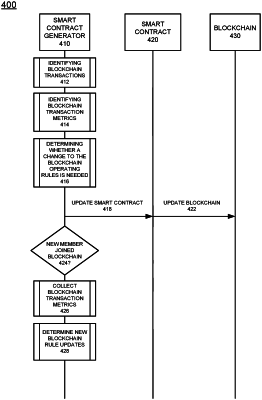| CPC H04L 9/0637 (2013.01) [G06F 21/602 (2013.01); H04L 9/3265 (2013.01)] | 20 Claims |

|
1. A method, comprising:
identifying, via a hardware-implemented smart contract generator, a plurality of blockchain transactions of a blockchain;
collecting, via the hardware-implemented smart contract generator, one or more blockchain transaction metrics from the plurality of blockchain transactions;
identifying, via the hardware-implemented smart contract generator, relationships between members of the blockchain based on the one or more blockchain transaction metrics, wherein the relationships includes two or more different types of relationships, each having different blockchain operating rules, wherein the types of relationships are: an explicit relationship, a linear relationship, a nonlinear relationship, and a proportional relationship;
prioritizing, via the hardware-implemented smart contract generator, the relationships based on the type of relationship;
determining, via the hardware-implemented smart contract generator, that the one or more blockchain transaction metrics require a change to one or more current blockchain operating rules of a smart contract stored in the blockchain based on a comparison of the one or more blockchain transaction metrics to a baseline generated by the smart contract generator;
modifying, via the hardware-implemented smart contract generator, the one or more current blockchain operating rules without changing a current consensus mechanism, wherein the modifying is based on the determining and on the prioritized relationships to generate modified blockchain operating rules; and
storing, via the hardware-implemented smart contract generator, a modified smart contract, including the modified blockchain operating rules, on the blockchain.
|